In Memoriam: Remembering a Cool, Creative Septuagenarian, Jean Marie Macaluso
A tribute to a late artist you never heard of, who passed away two years ago.
With this piece, I’m launching a new Oldster feature: In Memoriam, in which writers recall those who have passed, who lived long, meaningful lives that touched our own. - Sari Botton
The first time I met Jean Marie Macaluso, in December, 2003, she put on a little show for me, singing “Friends in Low Places,” as she danced along. The second time I met her, she was so happy to see me, she knocked me down, pinned me to the floor, and aggressively hugged me until my husband, Brian, pried her off of me.
Jean was Brian’s eldest sister, my sister-in-law, and two years ago today, on February 10, 2021, we lost her, at 71.
Jean was a prolific, talented outsider artist, and in her own way, a memoirist, too. Now and then it occurs to me that she would have loved Oldster Magazine, and been eager to contribute to it. I’d like to think that where ever she is now, she’s probably thrilled to be featured.
Born in 1950, Jean was a true hippie. She and two of her sisters attended the original Woodstock festival in the family’s VW van. (The girls told their parents it was a “cultural event,” prompting mom and dad to hand over the keys.) She raised her family in a commune on Prince Edward Island, and after her four sons were grown, she traveled the country, sometimes hitchhiking, sometimes on Green Tortoise buses. From time to time, she was homeless. She loved attending Rainbow Gatherings, and spoke often (soooooo often) about wanting to recreate that sort of utopia in her everyday life.
Jean drew and painted constantly, filling up sketch book after sketchbook with what was essentially graphic memoir. She worked primarily in self-portraiture, collage, and autobiographical writing, trying to make sense of the world through self-examination. I suppose that in her own way, like Annie Ernaux, she was an “ethnographer of the self.”
That focus led some to label her work narcissistic. But while Jean herself could often be a bully and a self-referential boor—talking about herself loudly and incessantly, holding you hostage as she repeated the same old stories until you started looking for a way to escape—as a memoirist myself, I appreciated her approach, and enjoyed much of her work.
I loved that she had a sense of humor about her mental illness. One time her mother said to her, “I think you’re getting crazier,” and she quipped, “Well, that’s my job mom—it’s what the government pays me for.”
Jean could be incredibly charming, too. She was super bright, a voracious reader and autodidact who delved into just about every subject, which meant she never ran out of things to excitedly tell you about.
I don’t think Jean would mind me writing about her darker and less appealing tendencies—her “shadow”—because she often did, in her notebooks, and on Facebook. I so admired the way she boldly embraced and studied those parts of herself. And I loved that she had a sense of humor about her mental illness. One time her mother said to her, “I think you’re getting crazier,” and she quipped, “Well, that’s my job mom—it’s what the government pays me for.”
Jean was larger than life. It was hard to imagine that anything could ever extinguish her light. But alas.
A little over a month before she died, Jean was hospitalized with Covid. While she was there, doctors discovered she had stage four ovarian cancer, which had metastasized to many spots in her body, including her lungs.
Jean had been unwell and wasting away prior to Covid. She didn’t know she had cancer because she distrusted medical professionals, and authority in general, so she avoided going to doctors. She lived with mental illness and submitted to just enough of an examination years ago to qualify for SSI benefits, but otherwise chose to go untreated.
Jean’s untreated mental illness made her difficult to be around—unpredictably moody, alternately charming and alienating. But it was probably also a factor in her endless creativity and talent as an artist.
Jean’s artwork could sometimes be rudimentary, like the crayon drawings of a child. Other times it could be more detailed and complex and rich. Now and then she’d PhotoShop her face onto representations of other characters in a way that reminded me of Cindy Sherman’s work.
In her art and her writing, Jean often pondered and flirted with death. In her final week, when Brian and I masked up and paid her a visit, she seemed resigned to it, but also scared.
At one point, she whispered to Brian, “Hold my hand?” and he of course obliged. I’m glad I was there to witness (and photograph) it.





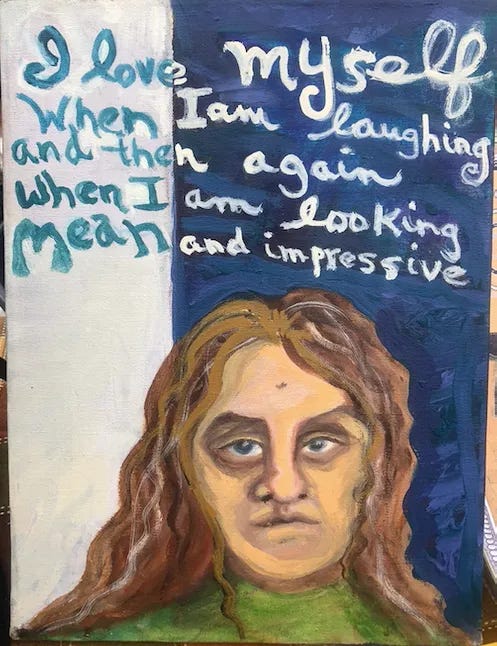
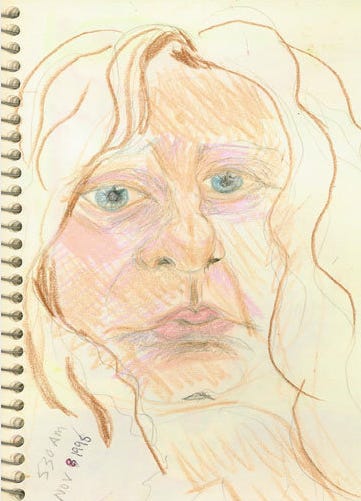
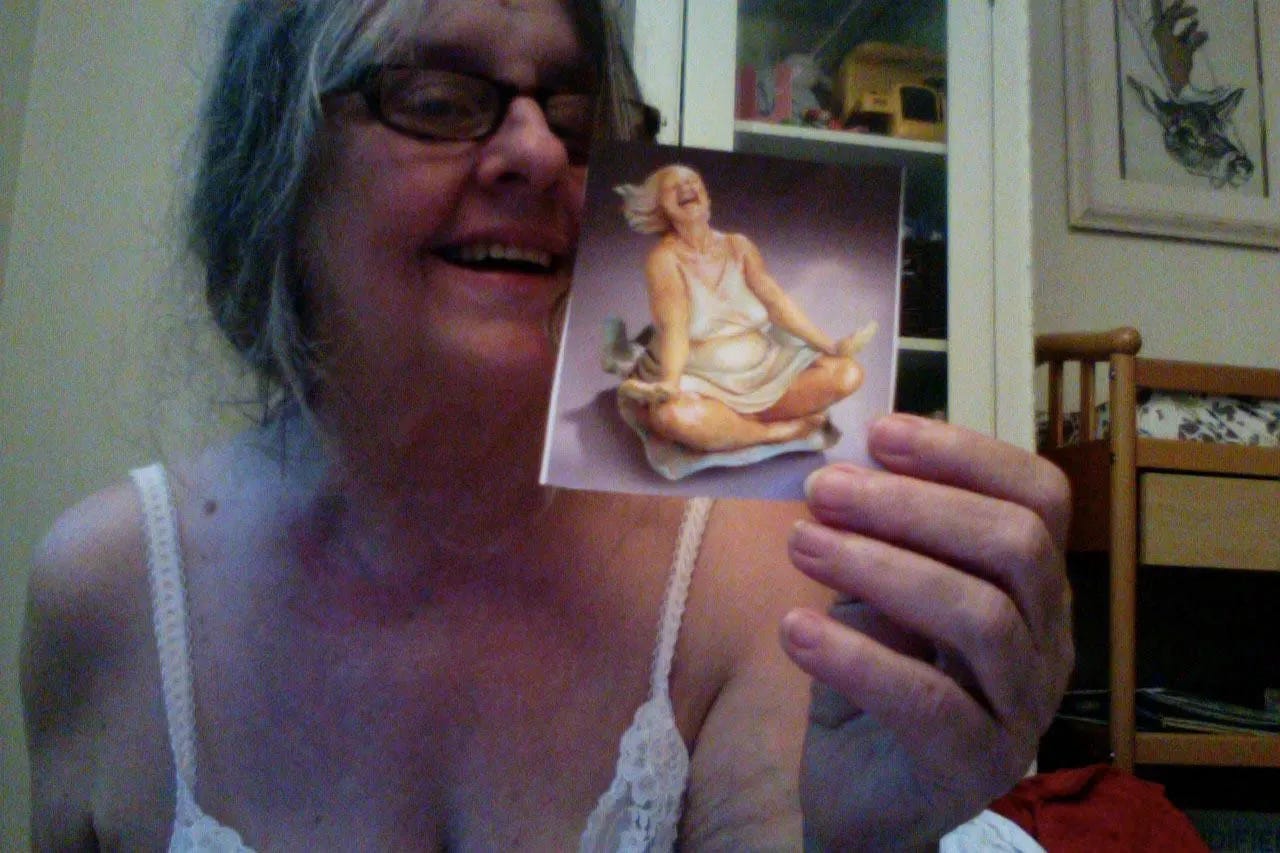
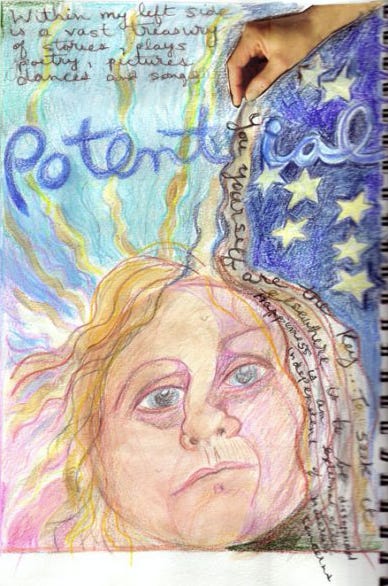

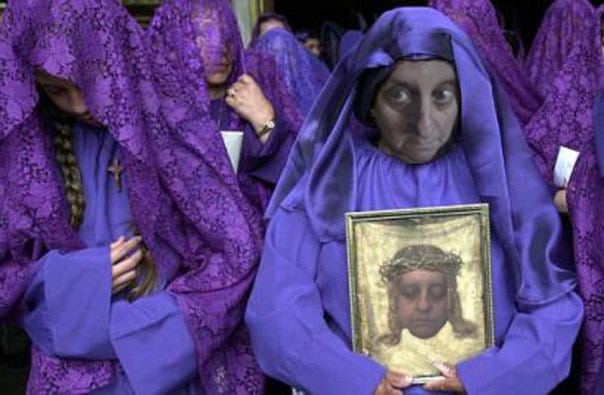
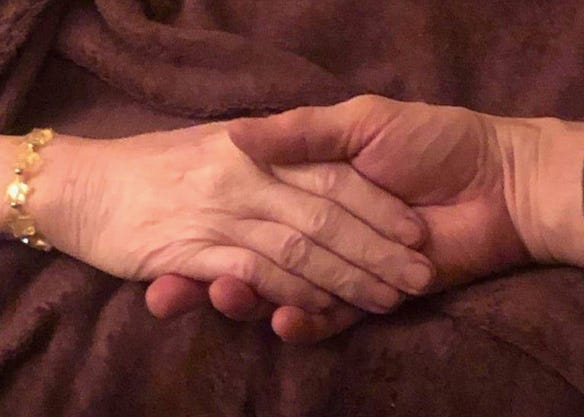
you know those days when you stay in bed a bit longer , and then think, "oh, I might need to tweak my schedule?" Todays was such a day, And to get to my writing , I wasn't't going to read anything, but as G-D, and my muses would have, I fell upon your piece and was compelled to take the pause.
And pause I did, while reading it, to wipe the tears, as well as enjoy the chuckles. I see so much of myself in Jean Marie. She lived her life, on her own terms, and has left some phenomenal art work to be shared. Mental Illness is such a wide open category. While labels help understand, they needn't define. What I find interesting is that often the alleged "normal" people, the ones who either made fun of, or excluded those who learned differently, or had a mental illness, then became the same people, who minimized those labels , saying, "don't we all have some mental illness" I remember when someone looked at me and said "we all have some sort of dyslexia" HA!
I suppose they were trying to be compassionate... who knows. What I do know is that I am so grateful to you for sharing this story, her story. It's a tribute not only to her, but to all those who pass on silently. May she rest in peace. And may her spirit her wild and artisitc spirit find home in others.
Thank you for honoring Jean! ❤️❤️❤️ I’m glad I got to learn about her today.